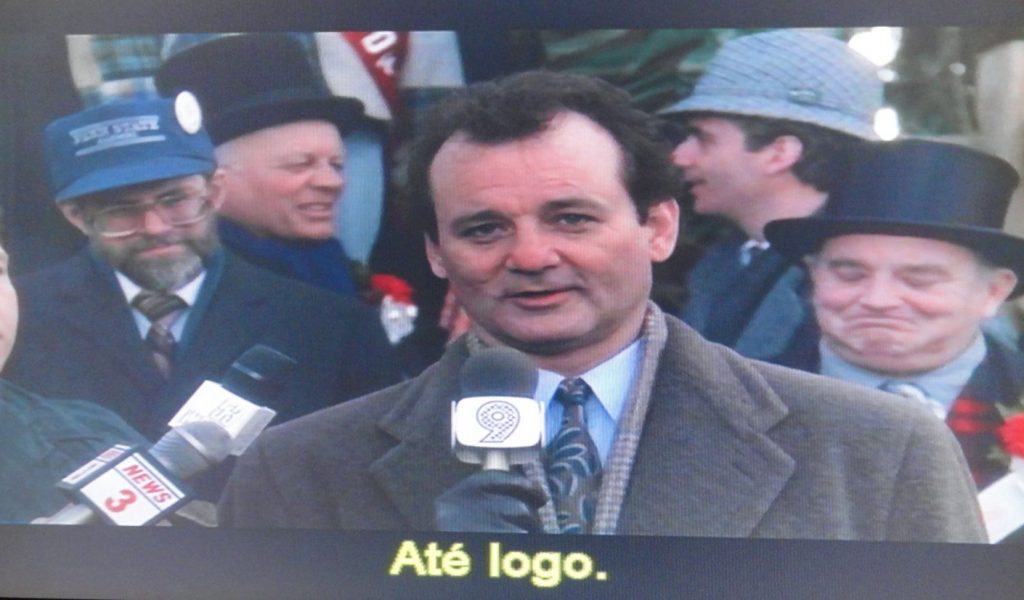We had an interesting lunch with CCBEU staff. Among other things, we talked about the culture of responsibility. It is a common complain among Brazilians that people here expect too much from the government and that the government delivers much too little. Everybody mentions the various corruption scandals that seem to surface with monotonous regularity. I was able to give a little favorable perspective. The Brazil I found when I returned after almost twenty-five years was better in almost every way than the one I left in 1988, I told them. Problems remain, of course. But they are not uniquely Brazilian and, IMO, many can be traced to expectations mentioned above.
I mentioned the work of Alexis de Tocqueville. Any American who has seriously studied our history is familiar with Tocqueville, but his fame doesn’t seem to cross our borders. I explained that Tocqueville was a French aristocrat who wrote about democracy in America in the 1830s. We Americans take lots of what he wrote as compliments; he didn’t always mean it that way. In the America that Tocqueville described, hard work, enterprise and money-making are the rule. Americans, he noted, do not defer to elites, as they still did in Europe. This included, to Tocqueville’s distress, not deferring even to those of “superior talent and intelligence.” America was a dynamic, although maybe a rude place. But the America was more exceptional in the amount of local and personal initiative.
In the Old World, citizens petitioned their government to do things for them. After that they waited for it to happen and complained when it wasn’t done right. Tocqueville observed that in America many of these “government” tasks were taken up by individuals in voluntary, often temporary, association. We formed task forces and committees to address local problems, bringing in government as last resort and even then resorting to government at the lowest level possible. In France at the time, power to make decisions about local roads or building codes would migrate to Paris and the choices made there. In America, they were often not made by government at all and when government was necessary, it was usually the local officials who called the shots.
American tradition of working through voluntary associations has persisted to this day. One of our colleagues said that this is what surprised him when he was on an exchange in the U.S. He gave the example of his host family and all the neighbors getting together to do the dirty work, literally shoveling manure, in the barns at the Indiana State Fair. In most other countries, this just doesn’t happen. At best, people might give money to hire somebody to do it.
I pointed out that government in the U.S. has plenty of problems and petty corruption, but one reason why it has historically been more responsive to the people is that we, the people, ask it to do less. Tocqueville warned of a “soft despotism” in democracies, where citizens vote for politicians who promise to give them things. When people have the habit (Tocqueville called them “habits of the heart”) to do things for themselves in voluntary association with their fellow citizens, it preempts the necessity of government intervention and also preempts the creation of a network of petty rules and regulations that are the bane of existence in the more bureaucratic states. Soft despotism is ameliorated if those voting benefits have to pay for them and even more so if they have to work in their creations.
My life in other countries has, IMO, helped me see America in a more objective way and I think there has been a convergence in the last quarter century. People in many other countries have become somewhat more active in doing things in voluntary association rather than waiting or demanding government action. I am certainly seeing that in Brazil. On the other hand, America has become more bureaucratized. Government has reached into voluntary associations in ways it did not before, establishing rules and standards that seem to make sense but end up crippling the voluntary impulse.
I read about a recent (Thanksgiving) example where the authorities in New Jersey have imposed various regulations on church-run soup kitchens. People can no longer bring food from home to donate and there are stricter rules on facilities and reporting requirements that will cost more than $150,000.00 a year. You can argue that such regulations are good, but they will have two effects. They will take it out of the hands of people and make another activity the responsibility of the government. In short order, costs will rise. The people who used to get satisfaction from carry out their responsibly as good citizens will resent the taxes and the recipients will get less and lower quality food.
Lawyers are also getting involved. People engaged in voluntary activities are now advised to get liability insurance. We are managing to make good citizenship costly and hazardous to your financial future. When you make things harder or more expensive, you get less of them.
America really was exceptional in the number of things we did voluntarily. Authorities are/were not always welcoming. I recall reading a biography of Ben Franklin, who was the godfather of many good citizenship practices. The local representatives of the king did not always welcome his self-help plans. They considered them subversive and they were right. When people can do things for themselves they become less dependent on the beneficence and largess of the state.
I am glad to see that people in many places around the world are seeing the benefit of acting outside both governmental and the strictly private spheres. People working together in voluntary association is the essence of community. We don’t make friends face-to-face; we make them shoulder-to-shoulder working on common goals. I think it is healthy that they are becoming more like us, even if that means American is less “exceptional”. But I am not healthy that we are becoming less like we were.








